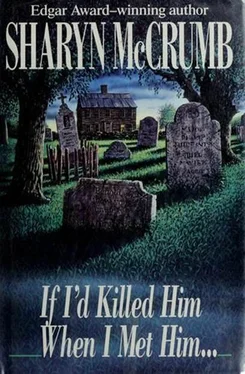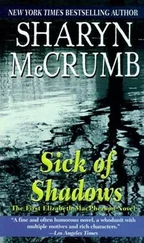“So you’d better talk to this guy about getting engaged,” said Rich. “Because I’m not available. And you’d better hurry, because in twenty minutes it will be show time, and then we’re outta here.”
“Right,” said Bill, consulting his notes and turning to the male half of the couple he had come to think of as the starboard-crossed lovers.
“Er-how do you do, Porky?” he said to the dolphin, who was still leering at him with an expression of antic cheerfulness.
“Give me a kiss, Porky,” said Miri Malone, puckering her lips and making smacking noises at Porky. Obligingly, the dolphin touched her lips with its own.
“Don’t lead the witness, Miri,” said Bill. “Lots of guys will kiss you, but it doesn’t mean they’re willing to get engaged. Does Porky kiss just anybody?” he asked.
Miri smiled. “Want to give it a try?”
“Can’t kiss clients,” said Bill, shaking his head. He turned back to Rich Edmonds. “He’d kiss just anybody, wouldn’t he? You, for instance?”
“Well, Porky’s a pretty friendly guy,” Rich agreed. “But he’s certainly more affectionate toward Miri than toward anybody else. He-how can I phrase this?-put the moves on her a few times in the pool. That’s only to be expected, of course. You can ask him yourself, you know. He understands human speech pretty well.”
Bill knelt down beside the dolphin. “Porky,” he said, resisting the urge to speak loudly. Where were its ears? “Miri says that you would like to leave the ocean park here, and go to live with her. Is that what you want?”
Porky whooped, and bobbed his head.
Bill looked to the dolphin’s trainer for a translation. “I’d say that was a yes,” he said.
“Watch this, and see what you think.” Rich went to a bucket near the tiers of seats and took out a fish. “Want a snack, Porky?”
Porky whooped again, bobbing his head vigorously. Bill thought the reactions were identical, but in proper legal fashion he remained skeptical. Perhaps the dolphin reacted that way toward any string of phrases addressed to him, regardless of their meaning. He leaned forward and said in a hearty tone: “Porky, would you like to end up in a can of tuna?”
Several minutes later, when Bill had gone through a stack of towels and was now reasonably dry again, he looked up at Miri Malone with salt-reddened eyes and shrugged. “All right, let’s assume for argument’s sake that he does understand what people say to him. How do we know that he understands the concept of marriage? And, by the way, there’s very little chance we’ll get any of this past a sober judge. But just supposing. How do we know he understands what you’re asking?”
Miri thought about it. “The conditions are spelled out in a conventional marriage ceremony, aren’t they? You could go point by point and ask him.”
“Sure, why not?” said Bill, dumping a small puddle out of his tasseled loafer. “Dolphin law. It could be a whole new area of specialization. We have to give him the benefit of the doubt, don’t we?” Solemnly he turned toward the pool. “Do you, Porky, take this woman to have and to hold? In sickness and in health?”
Elizabeth MacPherson sat on the rug in her living room surrounded by a stack of old books and dog-eared photocopies on loan from Everett Yancey. Bill was off in Florida on a daft case for one of their mother’s friends. She had finished dinner; now she planned to spend most of the evening listening to classical guitar on the stereo while she read material on the Lucy Todhunter case. She was only about a quarter of the way through the documents after an hour of reading, and making notes of comments that seemed relevant to the case, but already she had a much clearer image of the Todhunters, having seen them characterized by friends, servants, and physicians.
From what she learned, Elizabeth did not regret missing the chance to meet them herself. In fact, she thought she had met versions of them several times in couples of her parents’ acquaintance. Philip Todhunter was the hearty, crass fellow, whom everyone suspected of having a terrible temper, although no one had ever seen it. Lucy was the smiling slender belle, with the Miss Georgia good looks, the brand-name vocabulary, and the decorator-magazine decor. As a couple, they would socialize with people important to the husband’s business interests, or the “right” people from the neighborhood or the country club, but no one would know them very well, because their conversation was confined to trivial pleasantries. Perhaps it was all they were capable of. Such people made Elizabeth feel five pounds heavier, and colt-awkward, because try as she might, she could not think of anything to say to them. She was glad that the Todhunters had been dead for more than a century, thus relieving her of the task of interviewing them in person.
Elizabeth turned to the transcript of Lucy Todhunter’s trial, but she found that the court record added little to the summary provided by Everett Yancey in his history of the case. Next she turned to a photocopy of a lengthy newspaper interview with Richard Norville. Since the case had been a cause célèbre in Danville, considerable coverage had been given to the trial, to the background of the unhappy couple, and to interviews with the principal witnesses. A pen-and-ink sketch of Norville, captioned WARTIME COMRADE: FAITHFUL UNTO DEATH, accompanied the article.
According to Richard Norville, his friend the major was something of a dandy, meticulous about his clothes and his possessions, but he was not a man of robust health. Philip Todhunter had suffered from neuralgia and stomach complaints during the war, and he was accustomed to dosing himself with patent medicines, in hopes of relieving his discomfort. Norville maintained, though, that despite his health problems, the major had been a good officer and, later in civilian life, a hardworking businessman.
“He was a hypochondriac and a carpetbagger,” Elizabeth remarked aloud. “I expect he was tiresome, but I wonder why anyone would want to poison him? Especially, why Lucy? If wives poisoned spouses just for being tiresome, entire continents would have to be used as prisons.” She added, “No offense, Cameron!” in case any angelic presences were passing through the room.
The journal of Dr. Richard Humphreys went into greater detail about the medical tribulations of the Todhunters. According to Humphreys’s narrative, Philip Todhunter was a cornerstone of his medical practice, forever calling in the physician to treat his headaches, his sleeplessness, and his aching joints. Humphreys noted that his patient was in the habit of dosing himself with patent medicines obtained from the cities he frequented on business. Despite the physician’s warnings about these nostrums, Todhunter was forever trying some new elixir guaranteed to cure all ills. Elizabeth thought she detected a note of asperity in the doctor’s description of his perpetually ailing patient. Apparently, he considered Todhunter a hypochondriac.
Humphreys’s attitude toward Mrs. Lucy Todhunter was altogether more sympathetic. He chronicled the difficulties of her pregnancies, and the sorrow and suffering that accompanied her miscarriages. She will not live to stand many more assaults on her constitution , Humphreys wrote. To my mind it is odd that the Major is so mollycoddling of his own health, and so indifferent to that of his wife. I have warned him that his determination to get an heir will make him a widower, but my counsel falls on deaf ears. I have told Miss Lucy as well, and she wept a bit and implored me to speak to Todhunter. Finally, I sent her off to White Sulphur Springs. The rest will do her as much good as the waters, I daresay .
Elizabeth read this passage three times, before finally putting the photocopy aside and staring at the white ceiling for some time. She resumed her reading with an air of determination. “Maybe Lucy wasn’t guilty,” she said aloud, turning a page. “I wonder if it can be that simple.”
Читать дальше












